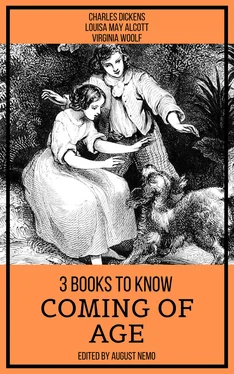It was Christmas Eve, and I had to stir the pudding for next day, with a copper-stick, from seven to eight by the Dutch clock. I tried it with the load upon my leg (and that made me think afresh of the man with the load on his leg), and found the tendency of exercise to bring the bread-and-butter out at my ankle, quite unmanageable. Happily, I slipped away, and deposited that part of my conscience in my garret bedroom.
"Hark!" said I, when I had done my stirring, and was taking a final warm in the chimney corner before being sent up to bed; "was that great guns, Joe?"
"Ah!" said Joe. "There's another conwict off."
"What does that mean, Joe?" said I.
Mrs. Joe, who always took explanations upon herself, said, snappishly, "Escaped. Escaped." Administering the definition like Tar-water.
While Mrs. Joe sat with her head bending over her needlework, I put my mouth into the forms of saying to Joe, "What's a convict?" Joe put his mouth into the forms of returning such a highly elaborate answer, that I could make out nothing of it but the single word "Pip."
"There was a conwict off last night," said Joe, aloud, "after sun-set-gun. And they fired warning of him. And now, it appears they're firing warning of another."
"Who's firing?" said I.
"Drat that boy," interposed my sister, frowning at me over her work, "what a questioner he is. Ask no questions, and you'll be told no lies."
It was not very polite to herself, I thought, to imply that I should be told lies by her, even if I did ask questions. But she never was polite, unless there was company.
At this point, Joe greatly augmented my curiosity by taking the utmost pains to open his mouth very wide, and to put it into the form of a word that looked to me like "sulks." Therefore, I naturally pointed to Mrs. Joe, and put my mouth into the form of saying "her?" But Joe wouldn't hear of that, at all, and again opened his mouth very wide, and shook the form of a most emphatic word out of it. But I could make nothing of the word.
"Mrs. Joe," said I, as a last resort, "I should like to know—if you wouldn't much mind—where the firing comes from?"
"Lord bless the boy!" exclaimed my sister, as if she didn't quite mean that, but rather the contrary. "From the Hulks!"
"Oh-h!" said I, looking at Joe. "Hulks!"
Joe gave a reproachful cough, as much as to say, "Well, I told you so."
"And please what's Hulks?" said I.
"That's the way with this boy!" exclaimed my sister, pointing me out with her needle and thread, and shaking her head at me. "Answer him one question, and he'll ask you a dozen directly. Hulks are prison-ships, right 'cross th' meshes." We always used that name for marshes, in our country.
"I wonder who's put into prison-ships, and why they're put there?" said I, in a general way, and with quiet desperation.
It was too much for Mrs. Joe, who immediately rose. "I tell you what, young fellow," said she, "I didn't bring you up by hand to badger people's lives out. It would be blame to me, and not praise, if I had. People are put in the Hulks because they murder, and because they rob, and forge, and do all sorts of bad; and they always begin by asking questions. Now, you get along to bed!"
I was never allowed a candle to light me to bed, and, as I went upstairs in the dark, with my head tingling—from Mrs. Joe's thimble having played the tambourine upon it, to accompany her last words—I felt fearfully sensible of the great convenience that the Hulks were handy for me. I was clearly on my way there. I had begun by asking questions, and I was going to rob Mrs. Joe.
Since that time, which is far enough away now, I have often thought that few people know what secrecy there is in the young, under terror. No matter how unreasonable the terror, so that it be terror. I was in mortal terror of the young man who wanted my heart and liver; I was in mortal terror of my interlocutor with the ironed leg; I was in mortal terror of myself, from whom an awful promise had been extracted; I had no hope of deliverance through my all-powerful sister, who repulsed me at every turn; I am afraid to think of what I might have done, on requirement, in the secrecy of my terror.
If I slept at all that night, it was only to imagine myself drifting down the river on a strong spring-tide, to the Hulks; a ghostly pirate calling out to me through a speaking-trumpet, as I passed the gibbet-station, that I had better come ashore and be hanged there at once, and not put it off. I was afraid to sleep, even if I had been inclined, for I knew that at the first faint dawn of morning I must rob the pantry. There was no doing it in the night, for there was no getting a light by easy friction then; to have got one, I must have struck it out of flint and steel, and have made a noise like the very pirate himself rattling his chains.
As soon as the great black velvet pall outside my little window was shot with grey, I got up and went down stairs; every board upon the way, and every crack in every board, calling after me, "Stop thief!" and "Get up, Mrs. Joe!" In the pantry, which was far more abundantly supplied than usual, owing to the season, I was very much alarmed, by a hare hanging up by the heels, whom I rather thought I caught, when my back was half turned, winking. I had no time for verification, no time for selection, no time for anything, for I had no time to spare. I stole some bread, some rind of cheese, about half a jar of mincemeat (which I tied up in my pocket-handkerchief with my last night's slice), some brandy from a stone bottle (which I decanted into a glass bottle I had secretly used for making that intoxicating fluid, Spanish-liquorice-water, up in my room: diluting the stone bottle from a jug in the kitchen cupboard), a meat bone with very little on it, and a beautiful round compact pork pie. I was nearly going away without the pie, but I was tempted to mount upon a shelf, to look what it was that was put away so carefully in a covered earthen ware dish in a corner, and I found it was the pie, and I took it, in the hope that it was not intended for early use, and would not be missed for some time.
There was a door in the kitchen, communicating with the forge; I unlocked and unbolted that door, and got a file from among Joe's tools. Then, I put the fastenings as I had found them, opened the door at which I had entered when I ran home last night, shut it, and ran for the misty marshes.
It was a rimy morning, and very damp. I had seen the damp lying on the outside of my little window, as if some goblin had been crying there all night, and using the window for a pocket-handkerchief. Now, I saw the damp lying on the bare hedges and spare grass, like a coarser sort of spiders' webs; hanging itself from twig to twig and blade to blade. On every rail and gate, wet lay clammy; and the marsh-mist was so thick, that the wooden finger on the post directing people to our village—a direction which they never accepted, for they never came there—was invisible to me until I was quite close under it. Then, as I looked up at it, while it dripped, it seemed to my oppressed conscience like a phantom devoting me to the Hulks.
The mist was heavier yet when I got out upon the marshes, so that instead of my running at everything, everything seemed to run at me. This was very disagreeable to a guilty mind. The gates and dykes and banks came bursting at me through the mist, as if they cried as plainly as could be, "A boy with Somebody-else's pork pie! Stop him!" The cattle came upon me with like suddenness, staring out of their eyes, and steaming out of their nostrils, "Holloa, young thief!" One black ox, with a white cravat on—who even had to my awakened conscience something of a clerical air—fixed me so obstinately with his eyes, and moved his blunt head round in such an accusatory manner as I moved round, that I blubbered out to him, "I couldn't help it, sir! It wasn't for myself I took it!" Upon which he put down his head, blew a cloud of smoke out of his nose, and vanished with a kick-up of his hind-legs and a flourish of his tail.
Читать дальше












